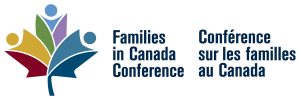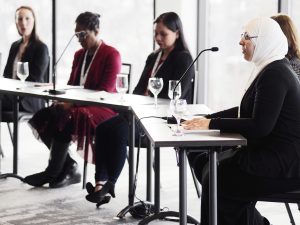Satellite Event: Families on the Move

On March 27 and 28, 2019, Memorial University of Newfoundland hosted a satellite event for the Families in Canada Conference 2019!
Download the Conference Report
Download the MUN FAM2019 Satellite Event Program
Geographical mobility and immobility are integral parts of daily life that affect us all. One of the key challenges for families is managing the diverse and divergent responsibilities of individual family members related to work, school, community involvement, recreation and other activities.
This can be particularly complex for some families, such as those who need to travel far from home for often prolonged periods in order to access education, work or health care (such as with many Indigenous people living in Newfoundland and Labrador); people who need to move frequently as part of their job and career (e.g. military, police); families living with disability; families new to Canada; families experiencing violence; and more.
Memorial University’s Families in Canada Conference 2019 satellite event focused on Families on the Move, where catalytic conversations will be fostered and facilitated among diverse delegates, including mobile workers, immigrants, First Nations, Inuit, military personnel, veterans, public safety personnel, survivors of domestic violence and people with disabilities, as well as those who study mobility and families among these groups, and those who serve and support them.
The satellite event at Memorial University was co-hosted in collaboration with the On the Move Partnership, Canadian Institute for Public Safety Research and Treatment, Military Families Resource Centre and the Stephen Jarislowsky Chair in Cultural and Economic Transformation.
The local panel sessions reflected the context of Newfoundland and Labrador with the following themes:
Panel 1: Lived Experience of Families on the Move

We are the experts of our own lives and yet so often those with lived experience are missing from the conversation. This panel gave voice to those who are most affected by mobility to understand how it impacts them and their families. Whether it is mobility for work, school or safety, associated challenges shape our everyday lives, including our needs for and access to support and services.
Panel 2: Researchers Studying Families on the Move
As our distance from an object increases, our perspective widens and we begin to see the forest for the trees. This panel brings together researchers who are studying the lives of differently mobile groups to give a broader view.
Panel 3: Serving and Supporting Families on the Move
This panel gives voice to those who support and serve families dealing with im(mobility). As mediators between families and government, they shared their knowledge about a) the mobility-related family life challenges they have identified among the groups they support and serve; b) the strategies they have developed to help these families deal with these challenges; and c) their recommendations for future policy change and research.
Panel 4: Positive Collaborations for Research, Service and Support for Families on the Move
Despite overlaps in our fields, academics, service providers and those with lived experience often operate in silos, disconnected from each other. And yet, as this conference aimed to show, learning the experiences of others can help inform our own understanding of the world. For this panel, we brought together examples of positive collaborations, or teams of researchers, service providers and community representatives, who have been working together to address issues and who shared their experience constructing and providing evidence-based service delivery.
Moderated Synthesis Session: Wouldn’t It Be Great If…?
Reflecting on the discussions held over the two-day event, this closing session provided an opportunity to look into the future and to finish the sentence “Wouldn’t it be great if..?” Exploring the issues that we wish the government or the public had more awareness of, the changes that need to happen to address concerns, and the opportunities that can arise if we work together, this was a space for contemplation and speculation to push the conversation forward and identify next steps for future research.

